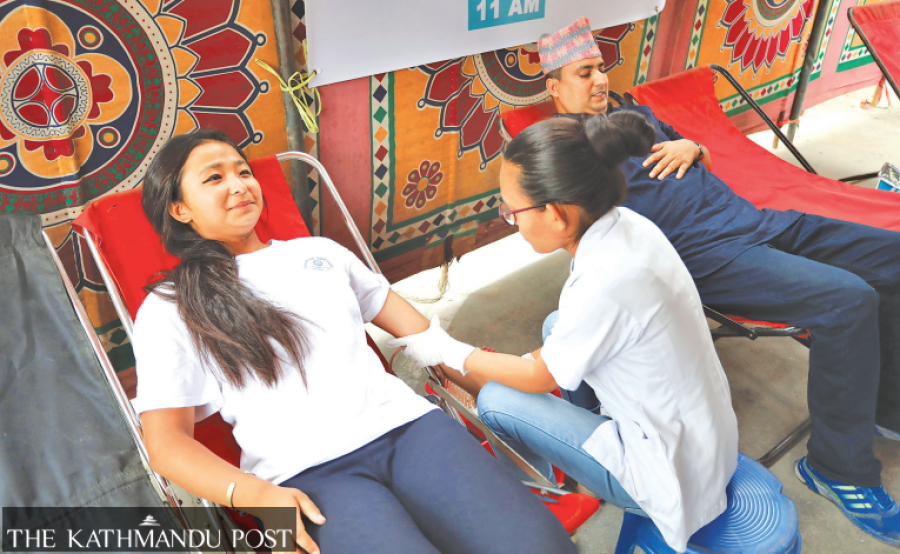Health
Blood bank warns of a looming crisis in two days
Central Blood Transfusion Service calls for blood donation amid a rapid surge in dengue cases.
Arjun Poudel
Narayan Neupane of Rainas Municipality-10 in Lamjung district struggled the entire Friday in search of platelets for his friend’s mother, who has been infected with the dengue virus.
The 60-year-old has been admitted to Tribhuvan University Teaching Hospital and doctors asked for two pints of blood immediately, citing her serious health condition.
“I reached the Central Blood Transfusion Service, Bhaktapur’s blood bank, and approached those of many hospitals in the Valley but found no blood,” said Neupane. “I didn’t know it would be so tough to arrange for blood in Kathmandu.”
As more people are getting infected with the dengue virus of late, blood collection has declined in the Valley. This has affected critical dengue patients, who need two to four pints of blood components.
Officials at the blood bank said that the demand for platelet-rich plasma and platelet concentrate has exceeded supply.
“We can arrange for blood components only for the next couple of days,” said Sanjeev Kumar Yadav, senior technical officer at the Central Blood Transfusion Service. “We would like to request the authorities to alert the Army, Police and Armed Police Force, among others, to donate blood.”
An understanding was forged in a meeting held a few weeks ago at the Ministry of Health and Population to keep Nepal Army and the Armed Police Force and Nepal Police as reserve force for donation, if a blood crisis arises.
As the major festive season comes closer and the number of people getting infected has been rising, officials at the blood bank fear a looming blood crisis.
“People infected with dengue cannot donate blood for one month,” said Yadav of the Central Blood Transfusion Service. “And many people will start to leave Kathmandu for Dashain in the coming days. Those who drink alcohol do not donate blood either.”
The Central Blood Transfusion Service, popularly known as the blood bank, processes demand for over 200 pints of platelet-rich plasma and platelet concentrate every day.
Neupane, from Lamjung, said he found blood only in the evening with help from Nepal Voluntary Blood Donors’ Society.
“Several people who called me yesterday morning for blood are still struggling to find donors,” said Prem Sagar Karmacharya, president of the Voluntary Blood Donors’ Society. “Coming days will be difficult for the patients infected with dengue virus.”
As the demand for blood has been rising, the blood bank has appealed to organisations and institutions such as banks, government offices and individuals to encourage members to donate blood. Experts warn of an acute blood crunch in the coming days due to decline in donations and the surge in new cases. The ongoing dengue epidemic would continue for several weeks due to continuous rainfall, which provides breeding ground for the vector.
Dengue is a mosquito-borne disease transmitted by female Aedes aegypti and Aedes albopictus mosquitoes. The same vector also transmits chikungunya, yellow fever, and Zika viruses, according to the World Health Organisation.
So far, around a dozen people have succumbed to the disease and more than 13,000 infections have been reported from across the country. Experts say reported cases of dengue could be just the tip of the iceberg, as around 90 percent of the infected people do not show any symptoms.
The deadly virus has been detected every month since January. The viral disease has already become endemic to Nepal, public health experts say.
Although the post-monsoon period is considered a high transmission season for dengue, Nepal has witnessed outbreaks of the deadly disease since the beginning of the year and in the pre-monsoon, monsoon, and post-monsoon seasons.
Asymptomatic people can easily spread the disease through vectors [disease-carrying mosquitoes], according to experts.
Mild to high fever, severe muscle pain, rashes, severe headache, and pain in the eyes are some of the symptoms of dengue, according to doctors.
Awareness campaigns on the risk of infection, and mosquito search and destroy drives are among the measures used to lessen the spread of dengue.
“Dengue spreading mosquitoes survive for 45 days and have already entered people’s houses,” said Dr Sher Bahadur Pun, chief of the Clinical Research Unit at Sukraraj Tropical and Infectious Disease Hospital. “Along with filling pools near the houses, people should also be urged to keep the house clean and tidy and spray mosquito repellents.”
In 2019, at least six people died and over 17,000 were hospitalised with dengue fever. The outbreak, which had started in the pre-monsoon period from Dharan, spread to 68 districts.
The World Health Organisation says there is no specific treatment for severe dengue, but early detection and access to proper medical care can save lives.




 9.83°C Kathmandu
9.83°C Kathmandu















